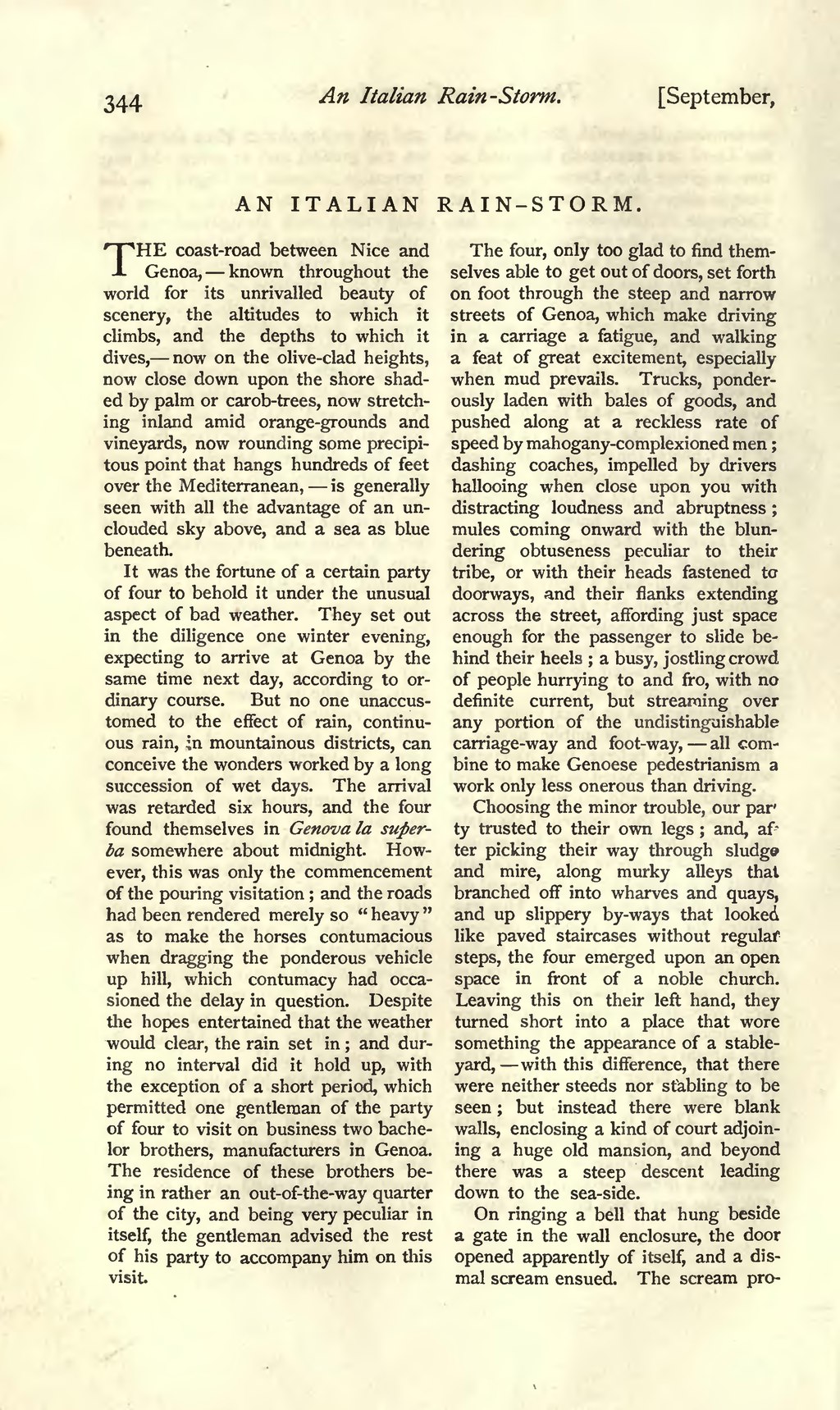AN ITALIAN RAIN-STORM.
The coast-road between Nice and Genoa,—known throughout the world for its unrivalled beauty of scenery, the altitudes to which it climbs, and the depths to which it dives,—now on the olive-clad heights, now close down upon the shore shaded by palm or carob-trees, now stretching inland amid orange-grounds and vineyards, now rounding some precipitous point that hangs hundreds of feet over the Mediterranean,—is generally seen with all the advantage of an unclouded sky above, and a sea as blue beneath.
It was the fortune of a certain party of four to behold it under the unusual aspect of bad weather. They set out in the diligence one winter evening, expecting to arrive at Genoa by the same time next day, according to ordinary course. But no one unaccustomed to the effect of rain, continuous rain, in mountainous districts, can conceive the wonders worked by a long succession of wet days. The arrival was retarded six hours, and the four found themselves in Genova la superba somewhere about midnight. However, this was only the commencement of the pouring visitation; and the roads had been rendered merely so "heavy" as to make the horses contumacious when dragging the ponderous vehicle up hill, which contumacy had occasioned the delay in question. Despite the hopes entertained that the weather would clear, the rain set in; and during no interval did it hold up, with the exception of a short period, which permitted one gentleman of the party of four to visit on business two bachelor brothers, manufacturers in Genoa. The residence of these brothers being in rather an out-of-the-way quarter of the city, and being very peculiar in itself, the gentleman advised the rest of his party to accompany him on this visit.
The four, only too glad to find themselves able to get out of doors, set forth on foot through the steep and narrow streets of Genoa, which make driving in a carriage a fatigue, and walking a feat of great excitement, especially when mud prevails. Trucks, ponderously laden with bales of goods, and pushed along at a reckless rate of speed by mahogany-complexioned men; dashing coaches, impelled by drivers hallooing when close upon you with distracting loudness and abruptness; mules coming onward with the blundering obtuseness peculiar to their tribe, or with their heads fastened to doorways, and their flanks extending across the street, affording just space enough for the passenger to slide behind their heels; a busy, jostling crowd of people hurrying to and fro, with no definite current, but streaming over any portion of the undistinguishable carriage-way and foot-way,—all combine to make Genoese pedestrianism a work only less onerous than driving.
Choosing the minor trouble, our party trusted to their own legs; and, after picking their way through sludge and mire, along murky alleys that branched off into wharves and quays, and up slippery by-ways that looked like paved staircases without regular steps, the four emerged upon an open space in front of a noble church. Leaving this on their left hand, they turned short into a place that wore something the appearance of a stable-yard,—with this difference, that there were neither steeds nor stabling to be seen; but instead there were blank walls, enclosing a kind of court adjoining a huge old mansion, and beyond there was a steep descent leading down to the sea-side.
On ringing a bell that hung beside a gate in the wall enclosure, the door opened apparently of itself, and a dismal scream ensued. The scream pro-
